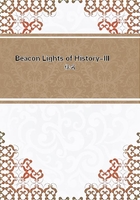
第91章
Closely connected with papal exactions was the enormous increase of the Mendicant friars, especially the Dominicans and Franciscans, who had been instituted by Innocent III. for Church missionary labor. These itinerating preachers in black-and-gray gowns were in every town and village in England. For a century after their institution, they were the ablest and perhaps the best soldiers of the Pope, and did what the Jesuits afterwards performed, and perhaps the Methodists a hundred years ago,--gained the hearts of the people and stimulated religions life; but in the fourteenth century they were a nuisance. They sold indulgences, they invented pious frauds, they were covetous under pretence of poverty, they had become luxurious in their lives, they slandered the regular clergy, they usurped the prerogatives of parish priests, they enriched their convents.
Naturally, Catholic authorities do not admit the extent of degeneration to which these Orders came in their increasing numbers and influence. But other historians strongly represent their evil conduct, which incited the efforts of the early reformers--themselves Catholic. One gets the truest impression of the popular estimate of these friars from the sarcasms of Chaucer. The Friar Tuck whom Sir Walter Scott has painted was a very different man from the Dominicans or the Franciscans of the thirteenth century, when they reigned in the universities, and were the confessors of monarchs and the most popular preachers of their time. In the fourteenth century they were consumed with jealousies and rivalries and animosities against each other; and all the various orders,--Dominican, Franciscan, Carmelite,--in spite of their professions of poverty, were the possessors of magnificent monasteries, and fattened on the credulity of the world. Besides these Mendicant friars, England was dotted with convents and religious houses belonging to the different orders of Benedictines, which, though enormously rich, devoured the substance of the poor. There were more than twenty thousand monks in a population of three or four millions; and most of them led idle and dissolute lives, and were subjects of perpetual reproach. Reforms of the various religious houses had been attempted, but all reforms had failed. Nor were the lives of the secular clergy much more respectable than those of the great body of monks. They are accused by many historians of venality, dissoluteness, and ignorance; and it was their incapacity, their disregard of duties, and indifference to the spiritual interests of their flocks that led to the immense popularity of the Mendicant friars, until they, in their turn, became perhaps a greater scandal than the parish priests whose functions they had usurped. Both priests and monks in the time of Bishop Grostete of Lincoln frequented taverns and gambling-houses.
So enormous and scandalous was the wealth of the clergy, that as early as 1279, under Edward I., Parliament passed a statute of mortmain, forbidding religious bodies to receive bequests without the King's license.
With the increase of scandalous vices among the clergy was a corruption in the doctrines of the Church; not those which are strictly theological, but those which pertained to the ceremonies, and the conditions on which absolution was given and communion administered. In the thirteenth century, as the Scholastic philosophy was reaching its fullest development, we notice the establishment of the doctrine of transubstantiation, the withholding the cup from the laity, and the necessity of confession as the condition of receiving the communion,--which measures increased amazingly the power of the clergy over the minds of superstitious people, and led to still more flagrant evils, like the perversion of the doctrine of penance, originally enforced to aid the soul to overcome the tyranny of the body, by temporal punishment after repentance, but later often accepted as the expiation for sin; so that the door of heaven itself was opened by venal priests only to those whom they could control or rob.
Such was the state of the Church when Wyclif was born,--in 1324, near Richmond in Yorkshire, about a century after the establishment of universities, the creation of the Mendicant orders, and the memorable usurpation of Innocent III.
In the year 1340, during the reign of Edward III., we find him at the age of sixteen a student in Merton College at Oxford,--the college then most distinguished for Scholastic doctors; the college of Islip, of Bradwardine, of Occam, and perhaps of Duns Scotus. It would seem that Wyclif devoted himself with great assiduity to the study which gave the greatest intellectual position and influence in the Middle Ages, and which required a training of nineteen years in dialectics before the high degree of Doctor of Divinity was conferred by the University. We know nothing of his studious life at Oxford until he received his degree, with the title of Evangelical or Gospel Doctor,--from which we infer that he was a student of the Bible, and was more remarkable for his knowledge of the Scriptures than for his dialectical skill. But even for his knowledge of the Scholastic philosophy he was the most eminent man in the University, and he was as familiar with the writings of Saint Augustine and Jerome as with those of Aristotle. It was not then the fashion to study the text of the Scriptures so much as the commentaries upon it; and he who was skilled in the "Book of Sentences" and the "Summa Theologica" stood a better chance of preferment than he who had mastered Saint Paul.